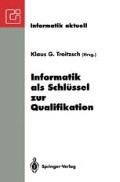Zusammenfassung
Unsere Gesellschaft verändert sich schnell von einer angebotsgesteuerten in eine nachfragegesteuerte. Mit dieser Veränderung änderen sich auch die Organisationsformen: ausgehend von komplexen Hierarchien für Massenproduktion über kleinere, produktorientierte Teamarbeitsorganisationen bis hin zu innovativen, kundengesteuerten Informationsnetzen. Die Entwicklungen in der Informationstechnologie fördern diese Veränderungen. Die Folgen für den Arbeitsplatz sind tiefein-greifend: Man arbeitet nicht mehr verantwortungslos, individuell in starker Tayloristischer Arbeitsteilung, sondern stets verantwortungsvoll, als Teamarbeiter mit kräftiger Computerunterstützung. Es ist klar, daß die von der Gesellschaft erwartete Allgemeinbildung ihrer Bürger dadurch stark beeinflußt wird. Statt nur repetitiver Fähigkeiten im Lesen, Schreiben und Rechnen werden kreative intellektuelle Fähigkeiten wie Analysieren, Abstrahieren und Modellieren verlangt. Eine neue Art von Alphabetismus wird erforderlich.
Access this chapter
Tax calculation will be finalised at checkout
Purchases are for personal use only
Preview
Unable to display preview. Download preview PDF.
Literatur
P. J. Denning, Computing as a Disciplin, Comm. ACM 32 (1989) 9–23.
A. P. Ershov, Programming: the second literacy, in: R. Lewis and D. Tagg (eds.), Computers and education (North-Holland Publ. Co., Amsterdam, 1981), p. 1–7.
P. Gorny, „ATEE’s proposal for a Teacher Education Syllabus,Literacy in Information Technology‘“, in: B. Sendov and I. Stanchev (eds.), Children in an Information Age (Pergammon Press, Oxford, 1986). p. 111–122.
C. H. A. Koster, Academische Berufsbildung für technisch orientierte Informatiker?, eine Rede gehalten zum Symposium „Technisch orientierte Informatiker: Aufgaben, Funktionen und Ausbildung“, Niederländische Gesellschaft fur Informatik, 16 Januar 1990.
S. J. Rosenschein, Distributed intelligent agents, in: P. H. Vogt (ed.), Personal computers and intelligent systems, Information Processing ‘92, Volume III (Elsevier Science Publishers B. V., Amsterdam, 1992), p. 61–63.
F. R. Ruiz i Tarrago, Integration of Information Technology into Secondary Education: Main issues and perspectives, in: T. J. van Weert (ed.), Guidelines for Good Practice, IFIP Working Group 3.1 (International Federation for Information Processing, Geneva, 1993) p. 7–15.
N. J. Rushby, Owning your learning, in: J. D. Tinsley and T. J. van Weert (eds.), Educational software at the secondary level (Elsevier Science Publishers B. V., Amsterdam, 1989 ) p. 91–95.
F. Samson, The computer as an educational aid for developing the pupils’ autonomy: An experiment carried out at the Lycee Pilote Innovant, in: B. Samways and T. J. van Weert (eds.), The impacts of informatics on the organization of education (Elsevier Science Publishers B. V., Amsterdam, 1992), p. 137–148.
D. Straub and J. Wetherbe, Information Technologies in the 1990’s: An organizational impact perspective, Comm. ACM 32 (1989) p. 1328–1339.
Basislehrgang Informatik,Bürgerinformatik’ für alle Schüler, in: W. Alt und K. Häfner (eds.), Informatik als Herausforderung an Schule und Ausbildung (Springer Verlag, Berlin, 1984) p. 47–56.
T. J. van Weert, Literacy in the Information Age, in: Bl. Sendov and I. Stanchev (eds.), Children in the Information Age (Pergamon Press, Oxford, 1988) p. 109–122.
T. J. van Weert, Informatics and the organization of education, in: B. Samways and T. J. van Weert (eds.), The impacts of informatics on the organization of education (Elsevier Science Publishers B. V., Amsterdam, 1992), p. 15–24.
T. J. van Weert, Application Oriented Informatics and Informational Disciplines: A symbiosis bridging the gap, in: R. Aiken (ed.), Information Processing 92, Volume II (Elsevier Science Publishers B. V., Amsterdam, 1992) p. 144–150.
T. J. van Weert, Education and Informatics: From discovery tp maturity, in: B. Samways and D. C. Johnson (eds.), Informatics and changes in learning (Elsevier Science Publishers B. V., Amsterdam, 1993) in preparation.
Editor information
Editors and Affiliations
Rights and permissions
Copyright information
© 1993 Springer-Verlag Berlin Heidelberg
About this paper
Cite this paper
van Weert, T.J. (1993). Informatik als Teil der Allgemeinbildung. In: Troitzsch, K.G. (eds) Informatik als Schlüssel zur Qualifikation. Informatik aktuell. Springer, Berlin, Heidelberg. https://doi.org/10.1007/978-3-642-78529-0_2
Download citation
DOI: https://doi.org/10.1007/978-3-642-78529-0_2
Publisher Name: Springer, Berlin, Heidelberg
Print ISBN: 978-3-540-57256-5
Online ISBN: 978-3-642-78529-0
eBook Packages: Springer Book Archive

